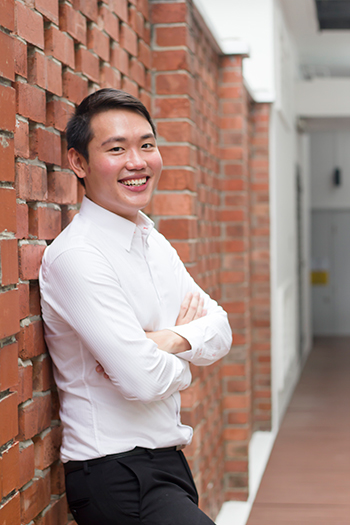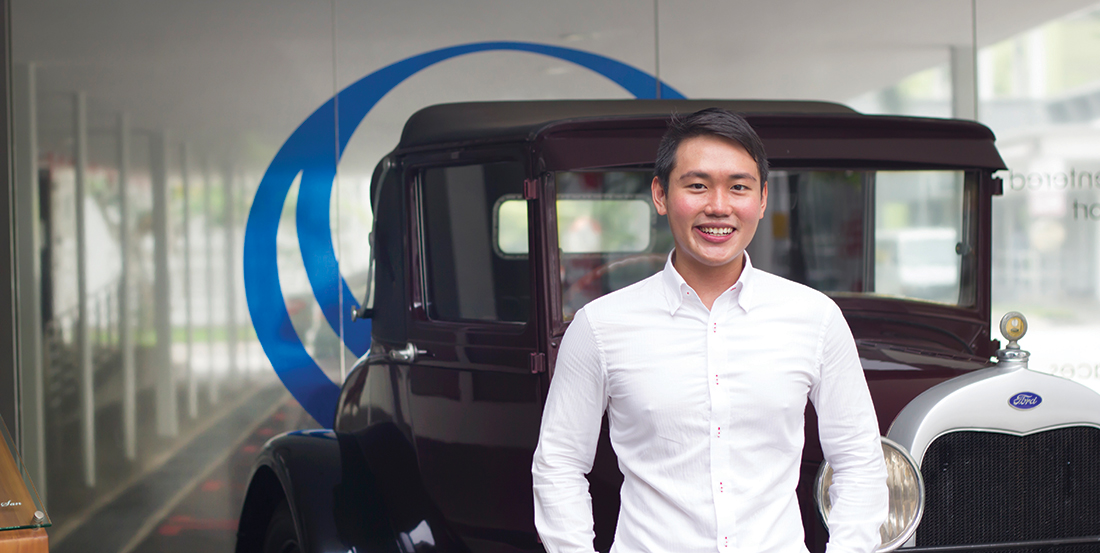F ast-paced cities across the world face an increasingly complex challenge – that of meeting the growing transport needs of their people. Transport matters affect virtually everybody, and the demands of today’s city-dwellers have never been greater.
In Singapore, the critical role of developing our urban transport infrastructure and systems is undertaken by the Land Transport Authority (LTA). It strives to enhance the travel experience for people in Singapore, and has seized ways to work towards this accomplishment. For instance, it has implemented sleeper replacement works on the East-West Line to ensure smoother journeys for commuters, and is replacing the signaling system on the North-South East-West Lines to increase the frequency of trains.
LTA Overseas Scholar Jerrold Thong is familiar with these projects. As an Executive Project Engineer, Jerrold carries out on-site project supervision of trackwork related activities for the sleeper replacement project. This requires him to liaise with various parties such as contractors, designers, stakeholders and SMRT Trains – all to ensure that activities are well-coordinated and interfaced.
This task of liaising with various parties engenders its own set of challenges. “Every party has their own objectives to meet and it can be tough to strike a balance. But at the end of the day, it is important to remember to step back and focus on the bigger picture. The ultimate focus is always on ensuring the safety of the public and how they will benefit,” Jerrold shares.
A Memorable Scholarship Journey
The sanguine individual chose the LTA Overseas Scholarship after being drawn to the array of career opportunities within LTA. The scholarship brought him to the UK’s University College London (UCL) to pursue his Master of Engineering (Mechanical with Business Finance). His master’s degree was a unique combination of Engineering and Finance units, and one that honed his analytical skills considerably.
But his education was not confined within the walls of UCL. He spent one of four years in the University of British Columbia in Canada as part of his exchange programme. These overseas experiences in two separate continents allowed him to witness the vastly different models of transport and sets of transport habits.

Jerrold Thong
LTA Overseas Scholar
Designation:
Executive Project Engineer
He tells us of his experience, “In London, people were heavily-dependent on public transport. On the other hand, people of Vancouver were mostly reliant on private transportation. From the perspective of a commuter, I was given a deeper understanding of the pros and cons of both transport methods.”
Also calling to mind the successful car-pooling system characteristic of Vancouver, which was started in 2013, Jerrold elaborated, “There is a dedicated app with which users can be directed to a registered car in close proximity. All they have to do is tap a card onto the car, and the car is theirs for the day! It is however difficult to adopt such a car-sharing method in Singapore given the limited parking spaces on which registered drivers can park their cars.”
Apart from the opportunity to live and study overseas, Jerrold was also given two internship opportunities in Singapore. The first was with the Rolling Stock division where he played a part in the testing and commissioning of trains for the North-South and East-West line. His second internship saw him fulfil roles in the Intelligent Transport Systems Centre (ITSC). He tells us, “In the ITSC, I was able to work in the Operations Control Center overlooking the expressway and gain an overview of traffic management. My two internship experiences gave me broad exposure to both our roads and our rails – important for LTA officers because these are inextricably connected.”
A Fulfilling Career
Fast forward many years and Jerrold sees his role in LTA as far from being a desk-bound one. For the past year, he and his project team had the chance to visit factories in Japan and the UK. These factories were where they were able to learn about the manufacturing systems of both countries’ respective transport sectors.
“Similar to the car-pooling system, Singapore cannot simply implement processes by which other countries run their transport system, because we have our own set of limitations. But there is so much we can learn from these countries. In LTA, it is not only the scholars who are given unique opportunities to gain new insights. Everybody is given this opportunity to learn together,” Jerrold muses.
Jerrold also takes pride in hosting students from NUS and NTU when they visit to learn about sleeper replacement works. He shares, “It is a good way for young people to better understand our work. For instance, they are informed that our trains slow down between certain stations in order to maintain safety and reliability. It is certainly satisfying to see these students appreciate the work that we do.”
As he looks into the future, Jerrold awaits his next rotation to a different department. He explains that scholars fulfil their roles in a department for about two to three years before being rotated to a different one. “Two years is a more reasonable amount of time to allow scholars to be able to delve deeper into an area of expertise. I am only in my first year and my sleeper replacement project has had me learning more about tracks and the third rail system,” Jerrold shares.
LTA scholars are also given the opportunity to do a six-month stint with the Community Partnerships Division. As its name suggests, this department aims at fostering partnerships with the people and listening to their thoughts and concerns. “It would be a good chance to work on the ground and hear from the public. As transport matters affect everybody, we are bound to receive feedback and criticisms. However, LTA officers need to develop a sense of empathy to understand the perspectives of people. It is also important to nurture an inquisitive mind and be receptive to new ideas and opinions. These should be the traits of a public sector officer,” Jerrold concludes humbly.

